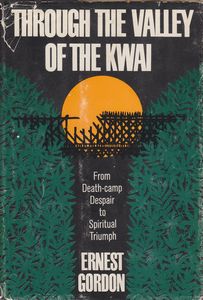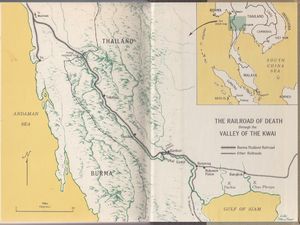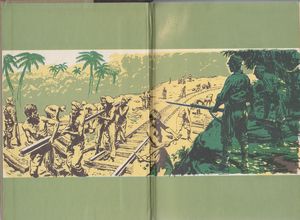Kwai (through the valley of the)
| série: | 2nd WW Pacifique |
| éditeur: | Harper |
| auteur: | Gordon Ernest |
| classement: | biblio2A |
| année: | 1962 |
| format: | hard cover |
| état: | BE+ |
| valeur: | 15 € |
| critère: | ** |
| remarques: | hard cover book, 256 pages, with jacket complete title: through the valley of the Kwai, froom death-camp to spiritual triumph 1/ the death house the dying smells surrounding the prisoner of war Gordon lying in the morgue end of the death house of a prisoner camp in the jungle of Thailand, corpses were as common as empty bellies and the priest giving absolution was called the Angel of death the story of Ernest Gordon, company commander of 93rd Highlanders who was stationed at Singapore, then before the surrender of Singapore, he managed to embark on the last British warship leaving Singapore for Sumatra orderly = attendant in a military hospital chore = small duty of piece of work, esp. an ordinary everyday task 2/ - soldiers at sea from Sumatra, Gordon made plans to join Australia, Ceylon or India, the nearest country free of japanese domination but these countries were far away, nevertheless they managed to equip a small ship which was named "Setia Berganti" >> p. 23 the map with the sea itinerary to reach Ceylon 10 men were sailing from Sasok (Sumatra) to the Batu and Pini islands (where they managed to stop the hostilities between two tribes) >> p. 23 the peace conference then they continued their voyage to Ceylon (about 1200 miles away = one month journey at 40 miles a day), but within one week distance of Colombo, they are stopped by a Japanese ship and made prisoners, 4 days later they arrive at Singapore now a dead city and questioned by the Kempei Tai (military secret police), then brought to the prison camp of Changi, 12 miles from Singapore 3/ - our hosts Gordon was to spend 3 1/2 years in Japanese captivity >> p. 52 the refined Japanese tortures compared with German POW camps where 4% of the prisoners died (but Soviet POW not accounted), the rate in Japanese camps was 27% >> p. 54 description of the Changi camp >> p. 58 as human resources failed, most men turned to God being a release from their torments and fears the next destination was Northern Malaya, then Thailand at the prison camp of Banpong where hard labor was expected, prisoners' life saver was a small wireless radio set the prisoners managed to get through but otherwise the prisoners were on the long slow slide 4/ - the valley of death the next camp, Kamburi camp near the Kwai river, middle in the jungle, was reached by marching; first the prisoners had to clear a camp area, then build a railroad including a bridge across the river for joining Bangkok to Rangoon, it was to be built within 12 months beginning June 1942; 60'000 native people (mostly Burmese, Thais, Malayans and Chinese) were human flesh to work with the British prisoners on that project: the railroad of death the bridge was finished in spring 1943 >> p. 70 comparison with the film and with Boulle's book 1952 which was only an entertaining story, prisoners in the reality were faced by brutality, terror, torture, disease, exhaustion, starvation, weather conditions (hot and wet) as well as hopeless degradation no food ration was allowed to the sick, escape was next to impossible (surrounded by a thousand miles of jungle), it was the law of the survival for the fittest and only dying was easy; it was also common practice to steal from each other, hate was the only motivation for surviving >> p. 81 description of the death house 5/ - miracle by the river Kwai the death sentence has been put on Gordon >> p. 88 his last letter to his relatives then near death, by chance Gordon was sent to a new home: a hut for himself to allow him to die in dignity but after the bridge and a good part of the railroad had been built, the attitude of the Japanese started to be more polite, Gordon received a better treatment and he was beginning to feel the miracle that God was working on his side in the death camp of the river Kwai 3/ - for thou art with me having recovered, Gordon thinks there may be a power beyond nature and men, he called it th "Most High", he wanted now to devote himself to others and started to lead a Christian community >> p. 118 comments about the bible (disasters as a consequence of sin), sufferings could not be explained (at least for natural disasters) but much were caused by man himself >> p. 136 comments about Jesus Christ (a friend and leader) Gordon found a meaning in life and his mind reached a state of truth and a peace in soul >> p. 143 the last words given to a dying man >> p. 119 to 134 pictures and drawings describing the conditions in a prison camp the most forlorn (desperate) of the sick were the amputees without legs, however some of their companions were able to fabricate an artificial leg and soon the fabrication of artifical legs with raw materials took place then came a jungle school for education and even a small library >> p. 149 the value of books the reading of Plato's republic, the ideal of society being freedom; these intellectual exercises hat the advantage of breaking monotony and making minds work furtheron an artistic activity developed (carving, etc), then creation of an orchestra (violin flute, etc) thanks to materials found in parcels of the Red Cross which managed to get through, finally the Japanese gave permission to use these self-made instruments because they wanted to be entertained >> p. 163 the first outdoor concert hall music was medecine for the soul, then came a ballet spectacle and even an opera with singing chorus, however the last experience was to improve medical practice (with plants of medicinal value, some of them with narcotic effects for the surgery) and finally blood transfusion could also be done; afterwards came the respect given to the dead (organizing funerals and proper graves with religious service), stealing ceased, mutual confidence grew 7/ - church without walls the building of a church for all Christian confessions (Methodists, Baptists, Episcopalians, Presbyterians, Congregationalists and former agnostics), it was a church of the spirit, the cross as a sign that God's son would suffer the same fate as the humans, it was of course an island of rescue for those who suffered of were tormented and at least the church gave rest before the death >> p. 177 the first communion and forgiveness towards the Japanese 8/ - Christmas day, 1943 the railroad was finished by end of November 1942 and the pressure of the Japanese relaxed >> p. 180 the first clean-shaven of Gordon's at midnight, 2000 men filled the church, during the service the rumble of an allied plane was spotted, a symbol of hope? even a Christmas pudding could be cooked somehow! the first nice evening since 1,5 years 9/ - on from Chungkai the railroad was 250 miles long, every mile had cost the lives of 64 prisoners of war and 240 natives and after the war the rails were torn up while the jungle did the rest then return to Chungkai, a transit camp to hold the survivors n.b. one of the few things the 93rd Highlanders was allowed to keep was their KILT! some prisoners were embarked to Japan and most of them dies during the transport (some torpedoed by their own people), for the first time, some mail was distributed to the prisoners later on Gordon was transferred from Chungkai to Nakawm Paton, next to a military air base, Japanese were hoping that allied air force would not bomb their own people, this was not always the case but nevertheless conditions in the new camp further improved, this camp was now a training ground for recovery the 1944 year was now the third year of captivity, the prisoners were now aware that the war would be won by the Allied but shall prisoners live long enough to see the end of the war? once more Christmas 1944 was celebrated 10/ the last trek then prisoners were sent back to the Kanburi camp in full view of the Kwai bridge >> p. 216 the words of Dostoevski in "the possessed": the one essential condition of human existence is that man should always be able to bow down before something infinitely great; the Infinite and the Eternal are as essential for man as the little planet on which he dwells the appearance of allied bombers was now nearly every day and the Kwai bridge was bombed continuously and finally was completely destroyed while on each destruction, the prisoners applauded like during a rugby match! however afterwards the Japanese started again to torment the prisoners, espc. the camp commandant who hated the British >> p. 220 the praise of the British soldier by general A.E. Perceval (the prisoners displayed some of the finest qualities of their race), then new transfer to a camp near Bangkok where British prisoners took care of badly wounded Japanese soldiers >> p. 221 aragatto = thank you in Japanese, maggot = kind of fly (bluebottle) that lays its eggs in meat >> p. 226 the pig = Japanese guard then there was a horrible march during 24 hours to a place where Japanese built a defense position but finally came freedom which burst out all over n.b. later on, the camp commandant was tried (put on trial) and sentenced to death, Dusty and Dinty, fellow companions of Gordon, were found dead, Dusty had even been crucified like his master Jesus by the Japanese 11/ - through the valley next Gordon boarded a Dakota plane for Rangoon watching during the flight the railroad through the valley (Chungkai, Tonchan, Kinsao, Takanun and the three pagodas pass) 12/ - ... and after in Rangoon, the survivors were taken for care in a military hospital by the WVS (women's volunteer service) of the British army), then by the end of October 1945, Gordon reached Liverpool by ship, then by rail to Glasgow where Gordon met his mother and this meeting was a great shock; Gordon married 17 days later! however remembrances of the captivity dogged Gordon still for years and loneliness was the worst problem on the return to the faceless mass and civilization >> p. 251 the vision of the Infinitely Great had been revealed through divine grace in the prison camp, now there was no vision any longer but Gordon was determined to follow that vision Gordon ended in studying theology in Edinburgh and participated in the Federation of Far Eastern prisoners of war, later on he became a Presbyterian pastor he wrote this book on suggestion of an editor of the Reader's Digest describing his human experience >> a very good book written 10 years after the one of Boulle, not fictional this time, giving an accurate description of the awful conditions of prisoners of war in Japanese camps and giving also a lesson of humility and spiritual resurrection when living in such conditions, fraternisation was not a vain word and at the bottom of the abyss came the spiritual triumph; Gordon explains that having suffered greatly, he and some other companions experienced a spiritual revival by praising God and finding salvation in the Christian faith the book mentions also some consideration and reflexion about our human life as well as the meaning of life and in our civilized selfish modern society, it lacks often this sense of friendship that was developed in prison camps |
| couvertures: |    |
Copyright 2008 - 2026 G. Rudolf
